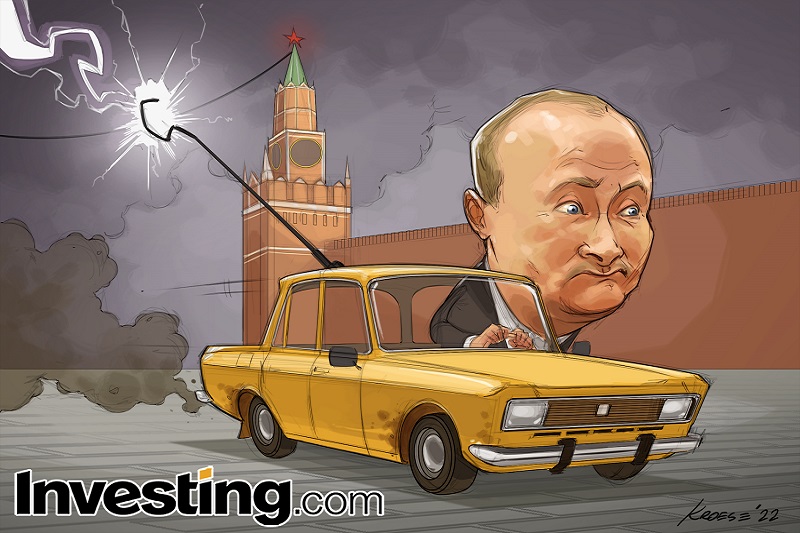By Geoffrey Smith
Investing.com -- Are the western world's sanctions against Russia, designed to punish it for its invasion of Ukraine, actually working?
At first glance it would seem not. The ruble hit a four-year high on Tuesday, according to official trading on the Moscow exchange. Even allowing for the fact that the ruble no longer floats, but is tightly managed by the central bank, that is still an impressive recovery from February, when panic selling by corporates and households drove the ruble to a new low of over 120 to the dollar.
The country now appears to have banished the near-term threat of financial collapse. The central bank has already reversed large parts of the emergency program it activated in February, cutting its key interest rate from 20% to 14% and, as of Monday, allowing companies to keep more of the foreign currency that they earn through exports (most of it will still be converted into rubles anyway to cover wages and tax payments).
Even a sovereign default, if it happens, will be the direct consequence of the U.S. government's control over the international financial system, rather than any expression of Russia's ability or willingness to pay. The Finance Ministry makes a point of telling the world every time it sends interest payments to the U.S. banks that distribute it to Russian Eurobond holders.
Nor is Russia apparently in any danger of running out of money to fight its war. Monthly budget data highlighted by the Moscow Times admittedly suggest that defense spending has more than doubled to around $300 million a day in April, but then the revenue the Kremlin is receiving from its oil and gas exports has also risen sharply since geopolitics put its big, fat thumb on the scale balancing supply and demand.
But financial stability is one thing, economic performance another. It may not be steep enough to spark the kind of social unrest that the West would like to see, but plenty of indicators still suggest that the country is heading for a long decline in living standards.
The reality is that western companies have been the main source of capital, technology and management expertise that has hauled the Russian economy into the modern age after 70 years of self-imposed ruin under Communism. Those companies are now withdrawing their capital, their products and their know-how. Some of these withdrawals will be relatively painless: as the likes of Nestle, McDonald’s Corporation (NYSE:MCD) and Heineken (OTC:HEINY) pull out, their new owners will no doubt continue to turn out comparable burgers and beer for some years using the equipment they inherit. The loss of luxury goods may hurt more, but will only hurt the small segment of the population that could afford them.
However, the withdrawal of industrial goods is a more serious affair. Without components from abroad, the factories built by the likes of Volkswagen (ETR:VOWG_p), Ford and Renault (EPA:RENA) over the last 20 years will soon have nothing to produce. Without spare parts from Boeing (NYSE:BA), Airbus, Rolls-Royce (OTC:RYCEY) and Safran (EPA:SAF), the airliners that now form the backbone of Aeroflot's fleet will have to be grounded, or cannibalized for spare parts. They will in any case lose their international airworthiness certificates as software licenses expire and deadlines for makers' safety checks get missed. Essential business services such as insurance, accounting and telecommunications will also be harder to come by, across all sectors of the economy, as - crucially - will medical devices and medicines such as insulin.
Central Bank Governor Elvira Nabiullina warned the Duma last month that the economy faces what she diplomatically called a "structural transformation," when prewar inventories run out. Andrey Klishas, a senior lawmaker for Putin's United Russia party put it more starkly last week:
"The import substitution program has failed completely. There is nothing but bravura reports of various departments. Our people see this, both in consumer goods and in many other areas," Klishas wrote in his Telegram channel.
The carmakers, in particular, pose a problem for the authorities, with their huge workforces that are the heartbeat of economic life for whole cities such as Togliatti and Kaluga. Small wonder that the city of Moscow, after taking back the keys to Renault's factory last week, immediately said it will revive the Moskvich - the archetypal Soviet-era clunker - rather than take the painful step of mass lay-offs.
Then there is a catastrophic brain drain to consider. An estimated 300,000 Russians, mainly educated and productive workers according to anecdotal accounts, have already left the country since February. Over 100,000 are in Turkey alone, according to Reuters. Many more expat managers in key positions have likewise fled: Rosneft's de facto chief financial officer Didier Casimiro, head of retail Avril Conroy, head of services Eric Liron and offshore head Zeljko Runje have all left the company this month. Expect the flight of human capital to accelerate if - despite Putin's assurances to the contrary - the army draft is widened as the war drags on.
Most importantly, for the Putin economic model at least, the country will struggle to sustain oil production as they lose access to U.S. companies such as Schlumberger (NYSE:SLB), Halliburton (NYSE:HAL) and Baker Hughes (NASDAQ:BKR).
The acute shortages of the 1980s may yet be a long way away, but the forces of international isolation and economic perversity that created them have long been set in motion, and the end result will, ultimately, be much the same.
